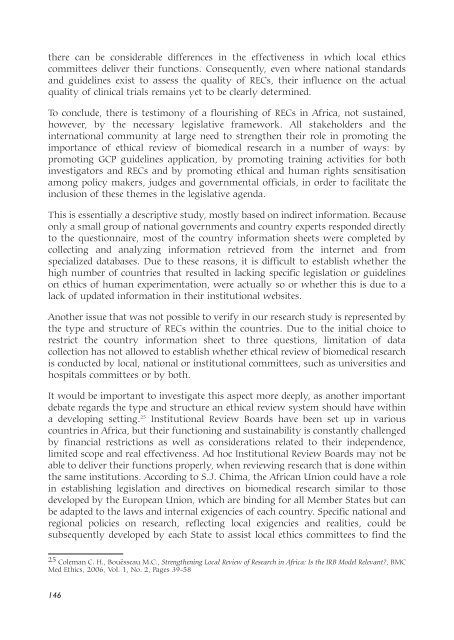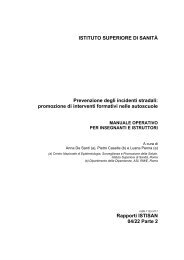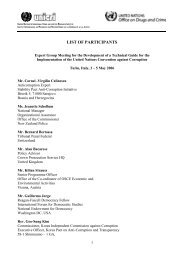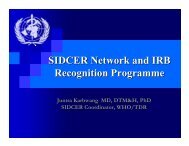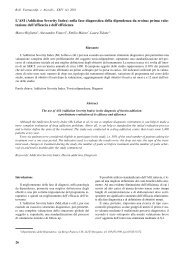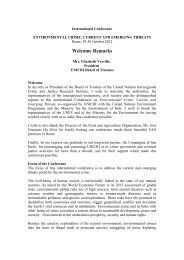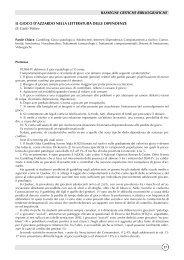Biomedical Research in Developing Countries - UNICRI
Biomedical Research in Developing Countries - UNICRI
Biomedical Research in Developing Countries - UNICRI
You also want an ePaper? Increase the reach of your titles
YUMPU automatically turns print PDFs into web optimized ePapers that Google loves.
there can be considerable differences <strong>in</strong> the effectiveness <strong>in</strong> which local ethics<br />
committees deliver their functions. Consequently, even where national standards<br />
and guidel<strong>in</strong>es exist to assess the quality of RECs, their <strong>in</strong>fluence on the actual<br />
quality of cl<strong>in</strong>ical trials rema<strong>in</strong>s yet to be clearly determ<strong>in</strong>ed.<br />
To conclude, there is testimony of a flourish<strong>in</strong>g of RECs <strong>in</strong> Africa, not susta<strong>in</strong>ed,<br />
however, by the necessary legislative framework. All stakeholders and the<br />
<strong>in</strong>ternational community at large need to strengthen their role <strong>in</strong> promot<strong>in</strong>g the<br />
importance of ethical review of biomedical research <strong>in</strong> a number of ways: by<br />
promot<strong>in</strong>g GCP guidel<strong>in</strong>es application, by promot<strong>in</strong>g tra<strong>in</strong><strong>in</strong>g activities for both<br />
<strong>in</strong>vestigators and RECs and by promot<strong>in</strong>g ethical and human rights sensitisation<br />
among policy makers, judges and governmental officials, <strong>in</strong> order to facilitate the<br />
<strong>in</strong>clusion of these themes <strong>in</strong> the legislative agenda.<br />
This is essentially a descriptive study, mostly based on <strong>in</strong>direct <strong>in</strong>formation. Because<br />
only a small group of national governments and country experts responded directly<br />
to the questionnaire, most of the country <strong>in</strong>formation sheets were completed by<br />
collect<strong>in</strong>g and analyz<strong>in</strong>g <strong>in</strong>formation retrieved from the <strong>in</strong>ternet and from<br />
specialized databases. Due to these reasons, it is difficult to establish whether the<br />
high number of countries that resulted <strong>in</strong> lack<strong>in</strong>g specific legislation or guidel<strong>in</strong>es<br />
on ethics of human experimentation, were actually so or whether this is due to a<br />
lack of updated <strong>in</strong>formation <strong>in</strong> their <strong>in</strong>stitutional websites.<br />
Another issue that was not possible to verify <strong>in</strong> our research study is represented by<br />
the type and structure of RECs with<strong>in</strong> the countries. Due to the <strong>in</strong>itial choice to<br />
restrict the country <strong>in</strong>formation sheet to three questions, limitation of data<br />
collection has not allowed to establish whether ethical review of biomedical research<br />
is conducted by local, national or <strong>in</strong>stitutional committees, such as universities and<br />
hospitals committees or by both.<br />
It would be important to <strong>in</strong>vestigate this aspect more deeply, as another important<br />
debate regards the type and structure an ethical review system should have with<strong>in</strong><br />
a develop<strong>in</strong>g sett<strong>in</strong>g. 25 Institutional Review Boards have been set up <strong>in</strong> various<br />
countries <strong>in</strong> Africa, but their function<strong>in</strong>g and susta<strong>in</strong>ability is constantly challenged<br />
by f<strong>in</strong>ancial restrictions as well as considerations related to their <strong>in</strong>dependence,<br />
limited scope and real effectiveness. Ad hoc Institutional Review Boards may not be<br />
able to deliver their functions properly, when review<strong>in</strong>g research that is done with<strong>in</strong><br />
the same <strong>in</strong>stitutions. Accord<strong>in</strong>g to S.J. Chima, the African Union could have a role<br />
<strong>in</strong> establish<strong>in</strong>g legislation and directives on biomedical research similar to those<br />
developed by the European Union, which are b<strong>in</strong>d<strong>in</strong>g for all Member States but can<br />
be adapted to the laws and <strong>in</strong>ternal exigencies of each country. Specific national and<br />
regional policies on research, reflect<strong>in</strong>g local exigencies and realities, could be<br />
subsequently developed by each State to assist local ethics committees to f<strong>in</strong>d the<br />
25 Coleman C. H., Bouësseau M.C., Strengthen<strong>in</strong>g Local Review of <strong>Research</strong> <strong>in</strong> Africa: Is the IRB Model Relevant?, BMC<br />
Med Ethics, 2006, Vol. 1, No. 2, Pages 39-58<br />
146


